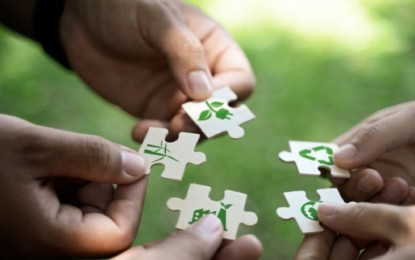
(Antara photo)
MANILA – The Asia Pacific Economic Cooperation (APEC) member economies’ adoption of Thailand’s “Bio-Circular-Green” (BCG) Economy Model will help build a "sustainable future" in the Asia-Pacific region, President Ferdinand R. Marcos Jr. said on Friday.
Speaking before his fellow Asia-Pacific leaders, Marcos said the BCG model would ensure a "level playing field" for all APEC members and reduce their vulnerabilities from the coronavirus disease 2019 (Covid-19) pandemic.
“It is for these reasons that the Philippines welcomes and supports the adoption of the Bangkok Goals on the Bio-Circular-Green (BCG) Economy, which is a concrete initiative that will lead the Asia-Pacific region towards a sustainable future," he said in his intervention during the Retreat Session of the 29th APEC Economic Leaders’ Meeting (AELM).
Marcos issued the statement, as he lamented the "uneven" recovery of the countries grappling with the pandemic because of a lack of full support for "green transition."
“My dear colleagues, as the world emerges from the downturn caused by the pandemic, it is evident that recovery has been uneven. Perhaps, even I would go so far to say it has been inequitable and insufficiently supportive of a green transition," he said. "Economies must leverage this opportunity to recalibrate policies to promote a green post-pandemic recovery.”
The final draft of the economy model, dubbed the "Bangkok Goals on Bio-Circular-Green Economy," is set to be endorsed by the 21 APEC member economies during the 29th edition of the summit.
The BCG economy model will serve as a roadmap for APEC sustainability and inclusive development with focus on four key areas – climate change mitigation, sustainable trade and investment, environmental conservation, and waste management.
Marcos backed the BGC model, saying it would help mitigate the "scarring and future" shock on the economy.
The economy model, he said, would also tighten social cohesion by ensuring "well-distributed" economic growth.
Marcos added that the BCG model, aligned with his administration's agenda to create green and quality jobs, would make Philippine institutions "responsive to the challenges posed by the current economic crises."
The Philippines also has the unique opportunity to leverage the tools of sustainability to improve the resilience of people and businesses, he said, citing the country's adoption of the Sustainable Finance Roadmap, which lays out a whole-of-government approach to promote sustainable finance and green policies.
Marcos also noted that the current socioeconomic priorities of his administration include the immediate implementation of the Green Jobs Act; the establishment of the green jobs certification system and incentive schemes; the development of the green workforce; and the issuance of green bonds for its infrastructure program.
“We actively support the adoption of innovative and sustainable supply chain systems and circular economy models that can systematically collect non-biodegradable packaging and agricultural and industrial waste for recycling and upcycling,” he said. (PNA)
